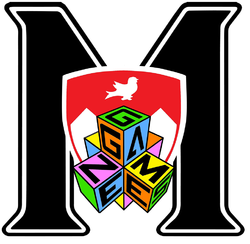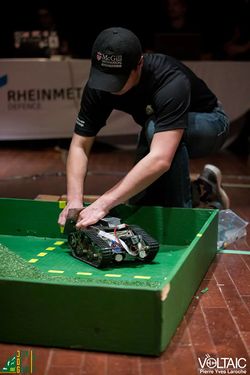Engineering Games
 | |||||||||||||||||||||||||||||||
| |||||||||||||||||||||||||||||||
The Engineering Games (also known as Eng Games or Jeux de Génie) is a province-wide engineering competition that unites a dynamic community of undergraduate students from 15 different schools. The Games serve as a platform for students to showcase their skills and knowledge in a variety of disciplines, along with the opportunity to network with numerous companies.
The competition occurs annually in the first week of January, with participants residing in a hotel together throughout the 4 days of the event. The community extends far beyond the competition itself, as students stay connected throughout the year with social events, and other activities that foster friendships and camaraderie.
Contents
Competitions
The Eng Games organizes a diverse range of competitions, each designed to highlight the multitude of skills necessary for one to excel as an engineer. These competitions encompass a wide array of disciplines such as robotics, academics, consulting, entrepreneurship, debates, improvisation, trivia, and sports.
Machine Competition
Recognized as the pinnacle event of the Games, “La Machine” is a highly esteemed robotics competition that encompasses a wide range of engineering disciplines and facets. In the four months leading up to the Games, each university assembles a small team entrusted with designing a robotic solution capable of executing specific tasks outlined in the design problem formulated by the organizers. The teams present their creations to a live audience on the last day of the Games and the event is broadcast online.
Entrepeneurship Competition
The entrepreneurship competition consists of 3 parts: developing a prototype for a new product that addresses a predefined problem, creating a business plan to justify the product's selection, viability, and implementation as an emerging company, and preparing a brief sales pitch to convince judges that it is the best solution for the problem. This challenge requires a lot of prior work, as participants must have completed the prototype and business plan before their arrival at the Games.
Academic Competition
Eng Games hosts six distinct academic competitions: chemical, electrical, civil, mechanical, software, and industrial engineering. Each discipline is divided into two components: practical and theoretical. The practical component is assessed through a three-hours open book exam, while the practical side consists of a lab or a small design competition. Each challenge is undertaken in teams of three or four participants.
Majeure and Capitale Competitions
The Majeure and Capitale competitions are intensive design challenges lasting for a duration of 4 to 6 hours, requiring a team of six participants. In the Majeure competition, teams are assigned the objective of constructing a small robotic device using a restricted set of materials, while also addressing specific challenges. As for the Capitale competition, it made its debut at the 2023 Games and focuses on civil engineering. In both competitions, teams are required to present their solutions before a panel of judges.
Consulting Competition
In the consulting competition, a team of four students collaborates to conceive and deliver their most effective solutions for a significant engineering problem. Social, economic, environmental, and political aspects of the solution must be considered when presenting to the judges, who represent potential clients. The quality of the solution, the written report, as well as the presentation are all graded to determine the best team.
Cultural Competitions
The Games host 3 types of cultural competitions: debates, improvisation, and trivia. In debates, a team of two students put their public speaking skills and sharp minds to the test by partaking in a classical debate on a topic chosen by the organizers. During the improv competition, a team of 4 participants demonstrate their imagination, creativity, and quick thinking in head-to head matches against opponents. During the trivia competition, teams of 4 students are tested for their general knowledge in a classic “génie en herbe” match. There are different rounds of questions and the team who wins a match advance to the next round in the hopes of winning the tournament.
Sports Day
During the sports day, every participant is required to compete as delegations go head-to-head, highlighting the importance of team spirit. The sporting challenges not only test individual physical abilities but also assess the cohesion and teamwork among team members. In addition to a mystery sport and an outdoor sport, an e-sport competition also takes place.
Participants
Eng Games Committee
At McGill, the Eng Games executive committee is generally composed of the following:
- One or two chiefs
- One VP Social
- One VP Mac Campus
- One VP Competition
- One VP Finance
- One VP Sponsorship
- One VP Gear
- One or two VP Machine
- Two parrains (ambassadors from other schools)
The chief or co-chiefs are chose by a selection committee, in January. The rest of the executive team are then chosen by the chief or co-chiefs in the following weeks. The executive members can be general members of the EUS or of BESS (bioresource engineering students).
Since Jeux de Génie is an event that is overseen by QCESO, the Eng Games committee falls under the VP External's portfolio. Bylaws for the committee and its positions can be found here.
Delegation
Each participating school sends a delegation of 44 students, plus 2 graduated ambassadors from other schools, known as godparents (parrains). Each delegation is made up of one (or two) chief(s), the executive committee, machine team members, and general members selected by the execs.
Selection Process
The selection process for the Games is called The Race (also known as La Course). It constitutes in a list of events that the executive committee attend and expect people who want to do the Games to go to. The events vary between parties, improvisation or trivia practices, sports days, etc. To participate in the race, students must buy a race shirt and fill out an interest form. Another way of getting selected to be a part of the delegation is by getting involved in the preparation of the machine or entrepreneurship competition. Join the group MGCIL Enggames 2021! on Facebook to keep track of events, and how to get involved!
Traditions
Jean Jacket
At Eng Games, every school has a specific item, often called delegation item, that participants are required to wear at all times and at all events. Other school's items include a kilt for Concordia, a bandana for Sherbrooke, a flag for Polytechnique. McGill's item is a sleeveless jean jacket with the McGill Eng Games logo in the back. Participants can then add all sorts of patches and pins to it to make it their own. Jean jackets are the only delegation item that isn't identical for every delegate. In fact, the jackets are usually bought at thrift stores or brought by a delegate, which causes the jackets to vary in color, size and design.
Grape Day
Each school that participates in Eng Games also has a delegation drink for which the recipe is kept only by the chief(s) and parrains. McGill's drink is called Grape Day and can typically be found at the Eng Games Blues Pub at the end of the summer, and at any other event organized by Eng Games throughout the year. Like every delegation drink, it is mixed in an 18L water barrel and usually passed around the room by someone who is considered in charge of the Grape Day. Furthermore, when students are given their jean jacket at the delegation inauguration, they are invited to drink some Grape Day as a symbol of their entrance in the MGCIL family.

